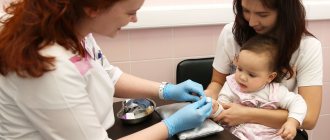Features of postpartum menstruation
It does not matter how the newborn was born - natural or through caesarean section. The mother always starts bleeding, the cause of which is placental abruption. The process of childbirth traumatizes the uterus; there is a wound inside it. She needs new endometrium for complete healing. What a woman sees after giving birth is not real menstruation. These are lochia that last up to 40 days.
Initially bloody lochia gradually become colorless. If blood is released from the genital tract again, this indicates the beginning of the first postpartum menstruation, or the development of pathology. Let's consider what factors influence the onset of menstruation in the postpartum period:
- Features of the course of pregnancy and childbirth.
- Duration of lactation. When breastfeeding, mothers begin bleeding after 6 to 12 months. If the baby switches to artificial feeding early, the mother will start her period in 5 to 8 weeks.
- Infant feeding regimen. Attachment to the breast on demand and later introduction of complementary foods delay the arrival of critical days.
- The presence of serious diseases of the reproductive system that the woman encountered before pregnancy or acquired later.
- Heredity. After the birth of a child, a young woman’s period appears at approximately the same time as that of a mother or grandmother.
If menstruation was painful before pregnancy, after childbirth this problem may resolve on its own. Bend of the cervix and other anomalies that interfere with the free flow of blood disappear due to the fact that the uterus stretches during fetal growth and does not compress the nerve endings. After childbirth, a woman notes the absence of menstrual pain.
If after childbirth your periods become heavier, this is due to an increase in the volume of the uterine cavity. The area becomes larger due to stretching of the organ. The amount of internal mucous membrane also increases. All this leads to long, heavy menstruation.
In the postpartum period, the uterus gradually contracts and by the beginning of the first menstruation its size is restored to the values that were before pregnancy. For several months in a row, bleeding may be irregular and vary in duration. In the absence of symptoms of gynecological diseases, such behavior of the reproductive system will not be a deviation.
During the period of postpartum spotting, until the cycle is established, a woman should carefully take care of contraception. Repeated conception several months after childbirth exhausts the weakened body even more and often ends in miscarriage.
Why do my periods come heavily after childbirth?
The first periods after childbirth can be very heavy for various reasons:
- Stress.
- C-section.
- Endometriosis.
- Uterine fibroids.
- Excess weight.
- Decreased immunity.
- Changes in prolactin balance.
- Incorrect course of metabolic processes.
- Natural childbirth, but complicated.
- Poor nutrition during pregnancy.
- Iron-deficiency anemia.
- Malignant neoplasms in the uterus and appendages.
- The growth of cysts and polyps that were small before childbirth.
- Chronic diseases that are not cured before childbirth.
- Disruption of the pituitary gland, thyroid and pancreas.
- Placental polyp (particles adhere to the uterine mucosa).
- Inflammatory and infectious diseases of the genital area (scars, adhesions, cystic cavities lead to menstrual irregularities and cause heavy bleeding; the infection is introduced into the genitals by obstetric instruments or penetrates through ruptures).
When there are heavy periods with clots after childbirth, the woman most likely has progressive endometrial hyperplasia.
The disease occurs against the background of hormonal disorders or birth injuries. Treatment in this case takes place in the form of a curettage procedure, which diagnoses the presence of a neoplasm and prevents severe blood loss. Hormone therapy is practiced after completion of lactation.
To treat anemia, the doctor prescribes iron supplements and gives recommendations on organizing a daily routine and proper nutrition. A healthy lifestyle, treatment of chronic pathologies and lack of stress accelerate the postpartum restoration of menstrual function.
Clots with an unpleasant odor that are released from the genital tract along with cramping pain may be particles of the placenta. Having concentrated in the uterine cavity and beginning to decompose, they become sources of infection. Sometimes foul-smelling clots are a sign of endometriosis.
Reason to urgently consult a doctor
Normally, the first periods after childbirth should be moderate. If a woman uses several pads during the day, and the bleeding lasts no more than a week, this is normal menstruation. But if the critical days drag on for 10 or more days, the appearance of the discharge is alarming, and your own feelings are disturbing, you need to urgently consult a gynecologist.
It is recommended to immediately visit a doctor if you have the following symptoms:
- One pad is not enough for 2 hours (daily blood loss is more than 20 ml).
- The color of blood is scarlet and bright.
- Body temperature rises for no reason.
- Intense blood loss is observed for more than 7 days.
- Menstrual discharge contains clots, purulent mucus, lumps, and foam.
- The contents of the gasket have a specific unpleasant odor.
- Spotting between periods with constant pain in the lower abdomen and lumbar region (discomfort increases during menstruation).
- Heavy intermenstrual bleeding with sharp pain in the lower torso.
If the child is six months old, he switched to artificial feeding a few weeks ago, and the cycle is not restored, the mother should also discuss this situation with the doctor. Lack of time to visit an antenatal clinic and ignoring heavy periods after childbirth lead to major health problems. The first of these is iron deficiency anemia.
Symptoms of iron deficiency in the body are:
- Weakness.
- Tachycardia.
- Pale skin.
- Drowsiness.
- Dyspnea.
- Irritability.
- Dizziness.
- Dryness and hair loss.
- Brittle nails.
- Fast fatiguability.
To prevent the dangerous consequences of anemia, doctors prescribe drugs that stop bleeding (hemostatics) and vitamin complexes that replenish iron reserves. Considering that excessive monthly discharge often indicates a disease, the patient is referred for an ultrasound of the pelvic organs and a blood test for hormones.
Heavy periods after childbirth: what to do
If after giving birth your periods begin to come more heavily than before, the doctor will tell you what to do in this case. First of all, you need to review your diet and introduce a large amount of fortified foods into the menu. Iron-fortified foods are especially beneficial. A woman should eat fresh vegetables and fruits every day.
Bloody discharge after childbirth
Immediately after childbirth, for 1.5–2 months, a woman observes bloody discharge with clots, which gradually become less intense and disappear. They are called lochia and accompany the restoration - involution - of the uterus, regardless of the method of delivery: natural or by cesarean section. Since lochia has a different nature of origin, it is not menstruation. Postpartum discharge helps the uterus return to the state it was in before birth. So, in a week, the affected reproductive organ “loses weight” by 300 grams, and after 2–2.5 months it completely returns to the weight category it was in before giving birth: about 70 grams.
This is interesting. After childbirth, a woman’s uterus is like a bleeding wound, since during the birth of the baby the placenta is separated from the reproductive organ, which is accompanied by multiple ruptures of blood vessels. And after a cesarean section, an incision on the body of the uterus is added to this.
Discharge after childbirth accompanies the process of recovery of the woman’s body
Video: features of the postpartum period
And again critical days
After childbirth, the hormonal background in the female body changes dramatically and it begins to work under completely different conditions. All the forces of the mother’s body are directed to feeding the baby, so it actively produces the hormone prolactin, which is responsible for lactation. Prolactin inhibits all cyclic processes of the reproductive system. In this regard, during breastfeeding, periods, ovulation and the possibility of conception are completely absent.
The first menstruation appears differently for each woman and depends on several factors:
- duration of breastfeeding;
- lack of lactation;
- mixed feeding;
- complications during childbirth.
In any case, sooner or later, critical days come for everyone to varying degrees of intensity and duration. Often the first menstruation occurs with an increased abundance of discharge, which cannot but alarm and even frighten the new mother, especially if it was not characteristic of her body before pregnancy.
The mechanism of the onset of menstruation
So, the lochia has passed, and the woman begins to languish in anticipation of her first period after childbirth. But before giving approximate dates for the resumption of the cycle, it is necessary to understand the mechanism of the onset of menstruation.
Menstruation (regula, menstruation) is a process of a physiological nature, the essence of which is the rejection of the mucous surface of the uterus, which occurs under the influence of hormones. Since the onset and course of regulation is determined by the endocrine system, it is necessary to understand the principle of its operation, which includes three phases.
The monthly cycle occurs in three phases
Table: phases of the menstrual cycle
| Phase | Deadlines | What's happening | Result |
| First (follicular) | Two weeks from the first day of your last period | Follicles (components of the egg) develop. | 1–2 dominant follicles stand out and grow. |
| Second (ovulatory) | Days 14–16 of the cycle | The walls of the follicle rupture, from which a mature egg emerges. | Ovulation occurs, meaning the woman can become pregnant. |
| Third (luteal) | 13–14 days from ovulation | The uterus is preparing for the implantation of a fertilized egg. If it does not occur, then the inner mucous membrane swells and the tissue begins to die. | Your period begins. |
When and how do you get your first period after childbirth?
The completion of postpartum discharge is not a signal for the resumption of the cycle, it is only the starting point of the final stage of recovery. And all because a woman’s hormonal background changes after childbirth. Let us dwell on the course of this important process in a little more detail. During pregnancy and breastfeeding, a young mother actively produces prolactin, the hormone responsible for the production of breast milk. However, prolactin has one more property: it inhibits the production of hormones that ensure the development and release of the egg. That is, theoretically, as long as there is a lot of prolactin, there will be no menstruation. In practice, it doesn’t turn out quite like that, because in addition to the hormonal background, which is unique for each person, there are other factors that influence the restoration of the cycle:
- heredity (as practice shows, the resumption of menstruation in women of the same family, but of different generations, occurs, plus or minus, at the same time);
- pathologies of various properties (including those associated with diseases of the pelvic organs);
- method and timing of feeding the baby.
Breastfeeding affects a woman’s hormonal levels, and therefore the timing of the resumption of menstruation.
If breastfeeding is practiced
When the baby begins to receive complementary foods and supplements, prolactin will begin to gradually decrease. Based on this premise, we conclude that if a woman is breastfeeding, then the starting point for expecting menstruation will be 4–6 months.
This is interesting. If a woman produces a lot of prolactin, then even when there are 1-2 feedings per day left, menstruation can begin only after final weaning and restoration of hormonal levels.
If a woman does not breastfeed
In this case, the young mother’s body does not need a large amount of prolactin, that is, the end of lochia, as well as the healing of the incision on the uterus in the case of a cesarean section, is the starting point for the resumption of the cycle, that is, 1.5 months after the birth of the child. Although 4-5 months without regulation is not considered a violation.
This is interesting. If, in the absence of lactation, 5 months after giving birth you still do not have your period, this is a signal to urgently consult a doctor.
If, due to the absence of lactation, menstruation does not last longer than five months, you need to consult a doctor
When do periods begin after childbirth?
The first spotting after childbirth - lochia - is usually abundant for the first 7 days, then its amount decreases in direct proportion to the healing of the uterine mucosa. Next, the cycle is restored for each woman individually.
If after the birth of the baby the mother practices breastfeeding on demand and continues it in this mode for as long as possible, then the first menstruation often occurs no earlier than 6 months later, that is, after the introduction of complementary foods to the child.
If, for objective reasons, a woman uses mixed or artificial feeding, then the regulation begins earlier, in the latter case - 6-8 weeks from the moment of birth. The timing of the onset of menstruation is an absolutely individual norm, but there are average dates that you should focus on - menstruation resumes 1.5–2 months after stopping breastfeeding.
Some women will experience unusually heavy periods after childbirth, others will experience scanty amounts of bleeding; painful periods can turn into comfortable ones and vice versa. In order to understand why such changes have occurred, you need to have a general understanding of what processes occur in a woman’s body during pregnancy and after it.
Heavy periods
Normal variant or pathology? The answer to this question will depend on the stage of regulatory restoration in question.
Intense discharge in the first two cycles
Apart from severe blood loss and unbearable pain, there are no reasons to seek emergency medical care in the first or second cycle. Although for preventive purposes you should definitely visit a gynecologist. The reasons for intense discharge may be:
- an increase in the area of the endometrium (the layer lining the uterine cavity from the inside) due to stretching of the reproductive organ after pregnancy and, as a result, an increase in the volume of menstrual blood;
- changes in hormonal levels (hormone balance has not yet reached its prenatal state);
- taking hormonal contraceptives before childbirth (menstruation becomes scarcer against the background of these drugs, which suppress ovarian function, so in comparison with them, the first menstruation after childbirth seems abundant);
- installation of an intrauterine device (the body of some women reacts this way to this contraceptive).
The first period after childbirth may be heavy and painful.
Clots in the first two cycles
Involution of the uterus is accompanied by the release of clots consisting of fibers, ruptured vessels and particles of membranes. However, it happens that during lochia the remaining clots do not come out, and menstruation began almost soon after the completion of postpartum discharge. Only in this case, during the first two cycles, the release of clots, which is not accompanied by pain, a pungent odor or a change in the color of menstrual blood, is not considered a pathological condition. But it’s still worth going to see a gynecologist.
When to see a doctor immediately
You can determine how heavy your periods are in a simple way: if, starting from the third cycle, the pad has to be changed every 1-2 hours, the bleeding is defined as intense. Typically, this problem is encountered by women after cesarean section or those whose menstruation began shortly after the end of lochia.
The intensity of discharge can be assessed by the rate at which the pad fills
Alarming symptoms
A woman should be wary of situations when:
- there are clots in menstrual blood;
- bleeding lasts more than a week;
- regulation is accompanied by sharp nagging pain in the lower abdomen;
- the discharge has a bright red tint;
- menstruation is accompanied by severe pain;
- Menstrual blood has a persistent, repulsive odor.
The presence of clots, an unpleasant odor with intense bleeding, accompanied by nagging pain - all these are alarming symptoms of pathology
Causes of heavy bleeding
There are a number of reasons that influence the nature of the discharge.
- Elements of the tissues of the fetal membranes remained on the walls of the reproductive organ.
- The second reason is related to the first: if particles of membranes remain, they can cause inflammation.
- The expectant mother is experiencing or has experienced severe stress.
- While carrying a child, the woman was diagnosed with anemia. Typically, this cause of abundant regulation is also manifested by a constant desire to sleep, fatigue, general weakness, pale skin, dry and brittle hair and nails.
Table: diseases of the uterus that provoke heavy monthly bleeding
| Disease | Causes | Possible consequences |
| Placental polyp | Particles of the baby's place did not come out during childbirth and adhered to the mucous membrane. |
|
| Hyperplasia (overgrowth) of the endometrium | Damage to the uterus during childbirth. | The development of endometriosis is the growth of the inner layer of the uterus beyond its limits, into the abdominal cavity. |
| Neoplasms in the ovaries and uterus (cysts, polyps, myomatous nodes) |
| |
| Infections, inflammation of the ovaries and uterus |
|
|
This is interesting. A cyst is a benign formation that occurs as a result of expansion, blockage with mucus and then an increase in the size of the glands of the cervix. A polyp is a fungus-like growth inside the cervical canal or uterine fundus, which is caused by inflammatory processes, sometimes by genetic predisposition, and is fraught with degeneration into a malignant tumor. Myomatous node is a benign formation from the muscular layer of the uterus.
The first periods after childbirth are very heavy: normal or pathological?
So what is the reason for heavy periods after childbirth? Many factors can serve as sources of such unpleasant symptoms. The first thing the doctor may do is ask you how the birth went, whether you gave birth yourself or had a caesarean section. Usually, complicated labor is the root cause of why the first periods after childbirth are very heavy.
The second most popular cause of this problem may be the general condition of the woman. If you had any chronic diseases before pregnancy, then you should not be surprised if after childbirth the first periods are very heavy and do not end for a long time.
Thirdly, there are frequent cases of heavy menstruation after birth injuries or inflammatory processes of the reproductive system. Remnants of undelivered placenta can also be the result of severe bleeding.
Treatment
After studying the medical history, the specialist prescribes appropriate therapy:
- medicinal (medicines that stop blood loss, analgesics, vitamins, iron-containing preparations, as well as folk remedies);
- hormonal treatment (only after the end of lactation);
- curettage (to remove tumors and placental particles contained in the endometrium).
This is interesting. Any treatment must be agreed upon with a doctor.
Table: drugs to stop bleeding
| Name | Indications |
| Askorutin |
|
| Tranexam | A potent drug that is incompatible with breastfeeding. |
| Dicyon | Prescribed for bleeding with clots. |
| Vikasol | An analogue of vitamin K, which affects blood clotting, but has many contraindications. |
Taking any medications should be under the supervision of a doctor
Table: folk remedies to stop bleeding
| Plants | Method of preparation and features of administration |
| A decoction based on shepherd's purse (nettle, hogweed, yarrow) |
|
| Decoction based on corn silk | The preparation method is described above, but take 1 tbsp. l. 3 times a day. |
| Teas with mint or viburnum. | When breastfeeding, you need to monitor the baby's reaction, as the milk may change smell and taste. |
| Oat infusion |
|
This is interesting. The first home remedy for heavy bleeding is an ice pack applied to the lower abdomen.
The use of folk remedies should also be agreed with a doctor.
Prevention
The problem that is provoked by abundant regulation after childbirth is large blood loss, leading to iron deficiency. Therefore, it is important both before and after childbirth to monitor your diet, as well as take complexes of vitamins and microelements (preferably with manganese and copper, which promote the absorption of other beneficial substances). In addition, there are a number of preventive measures to prevent critical loss of iron from the body.
- Eliminate fatty foods, carbonated drinks, and fast food from the menu.
- Regularly undergo examination by specialists.
- At the conception planning stage, carry out all necessary diagnostic and preventive procedures.
- Do not neglect rest and adherence to the daily routine.
- Avoid stress.
Heavy menstruation after childbirth can be either normal or pathological. In any case, it is worth consulting with a gynecologist and undergoing all diagnostic procedures prescribed by a specialist to determine the most optimal way to alleviate the condition, as well as to prevent iron deficiency anemia. At the same time, it is equally important to adhere to recommendations regarding lifestyle, including diet and vitamin intake before pregnancy, during, and also during breastfeeding.
Treatment of heavy bleeding
If a woman sees a doctor on time, outpatient treatment is possible, but more often, after all the examinations, the woman is placed in a hospital and the following medications are prescribed:
- hemostatic drugs;
- drugs to restore iron in the blood;
- vitamins.
After the woman’s condition has stabilized, the doctor may prescribe preventative procedures. Traditional methods and even homeopathy may not be superfluous, but before doing anything, you must consult with a specialist. Answer to the question “After giving birth, the first periods are very heavy - is this normal or not?” Only a doctor can give it, since everything is individual.
Heavy periods after childbirth are neither normal nor pathological. Every woman’s body is individual, and if bleeding does not worsen your overall well-being, you don’t have to worry about your health.
If the discharge is accompanied by severe pain and pieces are visible in it, you need to contact a gynecologist for clarification.











